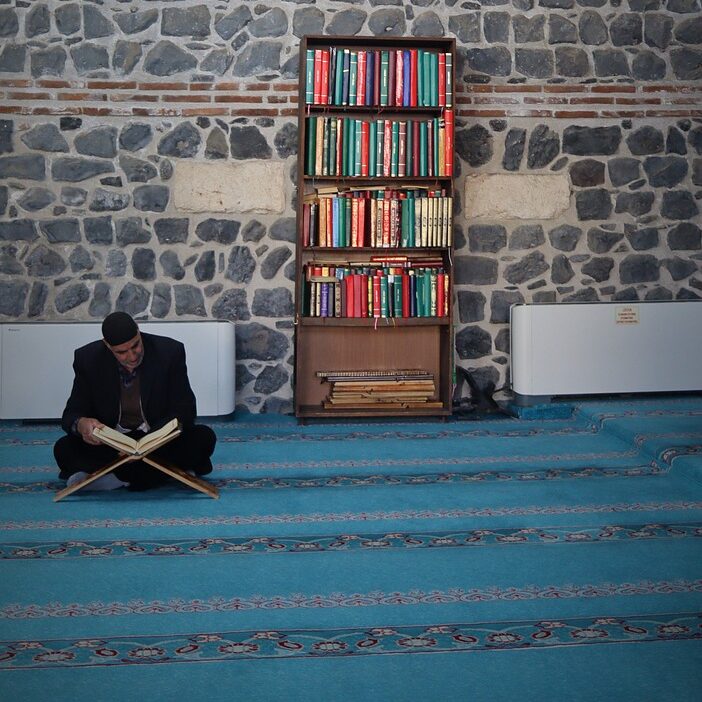The month of Jumada al-Awwal is the fifth month of the Hijri Calendar. Although it’s not a sacred month, there are historical events which took place which we can reflect and learn from.
The word ‘Jumada’ comes from the word dry or parched, and can also mean to freeze. In Arabia, it was common practice to name months per their season and that’s why it was named as such. Although it may not be relatable to our weather conditions today, it was relevant to the weather conditions and the season at the time.
It’s also thought that the second name for the month which is Jumada al-Ula means to ‘take charge’ or ‘take care’ during the cold. Given we’re in Winter, we can connect to this and embody the spirit of the month as we head deeper into the chilly season.

Serving us a reminder
As we head into December, we reflect on the year that has passed. For some looking back can be difficult, and for others, it’s a sweet memory. It’s beneficial to look both ahead, and into the past, to see how far we’ve come, and what lies ahead.
It can be painful to look to the future, especially given the current events we’re in as an Ummah. But doing so also gives us hope of a brighter future, of justice being served, and du’as being answered. Every test, sacrifice and hardship served to us, is a blessing on a silver platter. As Muslims, we believe that in our heart and soul and this serves as a comfort for us.
Big events in our lives, and in the lives of the entire Ummah, forever shape how we look at the world. It shakes us to core unapologetically, and forces us to wake up. It leaves no room for us to wait, to think twice and sit quietly. It pushes us to our feet, and we act.
The death of Fatima (ra)
Life, death, marriage and birth are all life-changing moments we cannot connect with. Some are earth shattering, and whilst others such as a birth bring everlasting joy. We find episodes of these embroidering the month of Jumada al-Awwal.
The first is the death of the Prophet’s (saw) daughter, Fatima (ra). She was known as the leader of the women in paradise, and was beloved to him. The Prophet (saw) said: “Fatima is a part of me, and whoever makes her angry, makes me angry.” (Bukhari)
She passed away around 6 months after the death of her father (saw). She was married to Ali (ra) and mother of Hassan and Hussain (ra), the leaders of the youth in Paradise. She was known for her devotion to Allah and to his Prophet (saw), her father, and her commitment to spreading the message. She was tested with hardship, poverty and loss all around her, but remained steadfast.
In this month, we’re able to reflect on the death of Fatima (ra) and the cycle of life. As Muslims, although we mourn the loss of life – and are surrounded with heart-shattering reminders of this, every day on our screens – our hearts rest amid the pain that our soul remains intact. Even with the ache we feel without the presence of our loved ones who have passed on, or with the atrocities that unfold before our very eyes, we seek comfort that justice will always prevail in the afterlife, where no crime goes unpunished.
Although we may feel alone in our drowning sorrow, the heartache we feel watching events unfold has been felt by generations and generations before us. The Prophet (saw) and his companions lived their lives to please Allah, and in doing so they were oppressed and tortured. They were thrown out of their own homes, harassed and tortured for spreading the truth.

Battle of Mu’tah
The Battle of Mu’tah is an example of the determination and courage of the early Muslims. It involved the Prophet (saw), his companions, and the Byzantine Empire. It occurred in a town in present day Jordan, known as Mu’tah. Islam was spreading far and wide, and the Byzantine Empire was aiming to curb its influence.
In response to the death of a Muslim envoy, the Prophet (saw) sent men with Zaid ibn Harith (ra) initially to deal with the issue. But the Byzantine Empire underestimated the strength of the Muslim army, and responded with violence, which turned it into a military operation.
The Battle of Mu’tah saw the display of three courageous leaders. Zaid ibn Harith fell in combat, and the Prophet’s (saw) cousin, Ja’far (ra) took lead. He was known as Ja’far at Tayyar because his arms were cut off but he still continued fighting and was given wings in Jannah as a replacement. Anyone who came in front of Ja’far was killed, and fought until he was killed. He fought courageously and was met with martyrdom. When the Prophet (saw) heard about Ja’fars death, he wept and prayed for his soul.
Once Jafar (ra) fell, Abdullah ibn Rawaha took lead, and continued to lead the Muslim forces. The Muslims held their ground, and the Byzantine Empire did not push further, leading to an end of the battle without a victory for either.
The battle left a mark on Islamic history as it shows the immense sacrifice, and commitment of the early Muslim community. The Prophet (saw) raised those who partook, and their dedication. The battle gives us hope in the unwavering strength of the Muslims, and of the leaders who, in their masses, cling onto the courage they have tightly. It serves us a reminder that, even in times of turmoil, unity and faith is displayed, inspiring Muslims for generations to come.

Capturing Constantinople
Constantinople is modern day Istanbul – a place that you may have visited or may be on your bucket list. Rich in Islamic history, and of course, endless city cats. In 453, the Ottomans, who was led by Mehmed II, who was only 21 years at the time, defeated the Byzantine Empire and took control of it.
The capturing of Constantinople from is often seen as a significant and historic event, which marked the end of the Byzantine Empire and the triumph of the Ottoman Empire. The victory of the Muslims is noted a success for Islamic history and shows us the courage and bravery of Muslims over the generations.
Embodying the month
Taking a peak at our history shows us both the heartache and victory embedded in our rich history. There’s moments where we’re able to gain inspiration or understand lessons. Knowing in both cases there’s always benefit and blessing.
As the year ends, let it serve as a reminder that we will travel through the journey of life, experiencing what unfolds before us, gathering strength to both move forward and be lessons for our future generations that we remain united and connected through it all.
The month also reminds us as the year comes to an end to take care of those among us who are struggling through the Winter season. You can do that by helping HHUGS families right here in the UK.